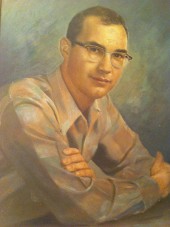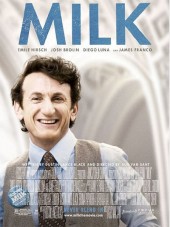Milk
Directed by Gus Van Sant
Written by Dustin Lance Black
Focus Features Productions
Premiered October 28, 2008
trailer • imdb • Amazon
Review by Billy Glover
Submitted March 18, 2009

Milk the movie, like milk the drink, is important (although I understand there are some people who can’t take either).
I think the movie is important, and it is educational and, in a way, entertaining. And it is interesting to consider Milk and Brokeback Mountain as movies, their timing and what they say to and about homosexuals.
Like Stonewall, Harvey Milk, the man and “event” owe a little of their success to the media.
As has been pointed out, not only did the movement for homosexual civil rights (and please, that covers — despite dear Morris Kight, et al. — gay rights, lesbian rights, queer rights, dyke rights, etc.) start in Los Angeles (Henry Gerber and any others were a blip and died fast), but so were the first of everything, including riots (or as Stonewallers prefer, “rebellions”) happened in California though the media ignored them.
And so lazy “historians” have ignored them just as they have ignored the founders of Mattachine and ONE, Incorporated. Has anyone wondered why there is no mention of Mattachine in the movie Milk?
Harvey Milk came to San Francisco, as hundreds of thousands of others came to California, some from New York, etc., perhaps because they knew that things were happening in California.
Hal Call came to California. He joined early Mattachine and immediately started taking over, using the clam that the founders were Communists and this would hurt the cause — which was probably true although some think that ONE went too far in the other direction, being operated mainly conservative Republicans (i.e. Dale Jennings, Don Slater, and W. Dorr Legg).
There should be no question that Harvey Milk was a great person who inspired man people, including those who heard of him in other places. But it does not take away one iota from him and his coworkers to point out that this is true of Harry Hay, Don Slater, Dorr Legg, Jim Kepner, Frank Kameny, Del Martin, Phyllis Lyon, Barbara Grier, Barbara Gittings, et al.
Such people, publications and organizations had been preparing the way for Stonewall and Milk since the early 1950s.
And that is true of Mattachine in San Francisco, and Hal Call, Don Lucas, et al. (Guy Strait, SIR, Tavern Guild, etc).
What worries me about Milk is its main point: success. All the marches, the victory of No on 6 — how would people have thought of this if they had seen it before the loss of Prop 8? You can’t miss the exact tactics used by the religious bigots on 6 and 8. Only time can tell if the people running No on 8 had learned nothing from the No on 6 people or if new times needed new tactics.
And if young people come away from Milk feeling good and hopeful, will they join an organization to continue Harvey’s work? Or do they think, despite anti-gay marriage wins, Milk did it, so we can just enjoy it?
Again, Harvey, like others, came to California because they thought it was better here, and thankfully a few like Milk joined to help make it even better. I’m not sure, as the movie hints, that generic “David Goodsteins” (and his Advocate) did.
But, as in other civil rights movements, it takes many ways to a goal, education, picketing, entertainment, etc. Hal Call and his Mattachine was visible — certainly from that great good and terrible convention in Denver in 1959, when innocent people voted to praise the mayor of San Francisco for being gay-friendly, the purpose of the person who made the proposal was to defeat the mayor and what happened, as so often in life, sometimes good and sometimes bad, is that it had the opposite affect. The newspapers were not gay-friendly, but they shouted that this was an “attack” not only on the mayor but on the citizens and city of San Francisco. Think what that word meant — it sure didn’t mean they were “gay-friendly.”
Hal Call and Mattachine were well known in San Francisco. Later others started working the cause from different angles, SIR (social until the stupid police forced them to be activists along with the preachers and attorneys of the newly formed Council on Religion and the Homosexual), the Tavern Guild (Bill Plath, et al), Guy Strait — no comment — his wonderfully campy U.S. News & Cruise News newspaper. And into the mix came Harvey.
But if people get a good feeling from Milk, did they get a realistic view? And how does that compare in promoting the cause of civil rights for homosexuals to Brokeback Mountain? That is not a “gay” movie. And while today many people say to those two men, and others like them, then and now, get out of that place and go to the big city. How realistic is that today, with our economy, as it was at the time of the movie?
And do we abandon the rest of the nation to religious bigots except the blue states and urban areas? As we abandon the churches to the bigots? And is it possible that many people, seeing and feeling the pain of the men of Brokeback Mountain might finally come to a better understanding of what society has done to homosexuals?
As entertainment perhaps Milk is better; as education, I’m not sure. And I wonder how I would feel if Milk had come first? But I have no doubt that both will influence everyone, even those who don’t bother to see the films.


